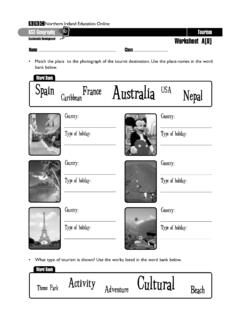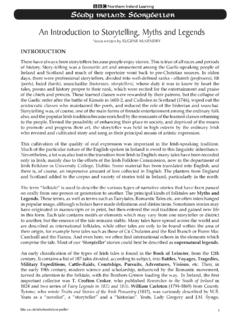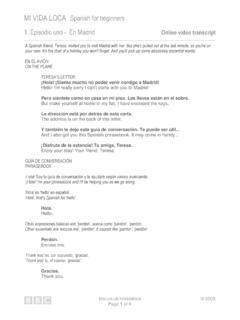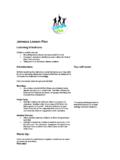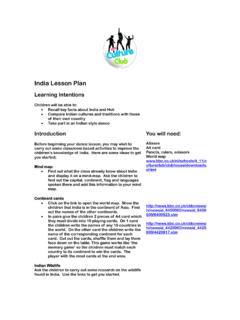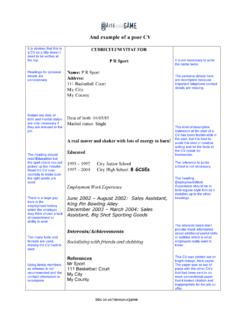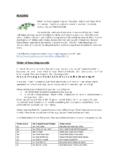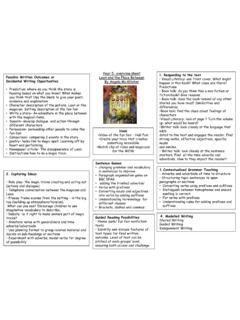Transcription of BBC / literature / formatted
1 english LEARNING. upgrade your . english . SHORT CUTS TO BETTER. english LANGUAGE SKILLS. A GUIDE TO READING. literature IN english . Welcome Learning english can be exciting and stimulating. Finding out that you can have a good conversation or write a letter to a friend in english can give your confidence a tremendous boost. However, it can sometimes be difficult to recognise the progress you are making. Learning english , like learning any new skill, takes time and patience but there are some shortcuts which can help you make an almost instant improvement to your english language booklet introduces you to some ideas which can help you upgrade your english .
2 Using extracts from BBC World Service Learning english radio programmes, this booklet will help you to On the final page you will find a glossary explaining some of the words 1 get out of a learning rut. and phrases in the in 2 widen your vocabulary. the glossary are underlined. 3 give yourself time to think in conversations. 4 change the tone of what you say. 5 keep the conversation going. 6 change your pronunciation. 7 improve your spelling. 8 upgrade your emails. How to use this booklet Each page looks at a different topic. On each page, you'll find . a short introduction which explains the topic.
3 An extract from one of the BBC World Service's Learning english programmes. a reading task to accompany the extract. key tips to help you upgrade your own use of english . a task to help you practise what has been explained. Free radio programme schedules Depending on where you are in the world, you can hear BBC World Service Learning english programmes on short wave, medium wave or FM. Details about programmes you can hear in your area and where to find them on your radio are contained in a series of programme can get a programme schedule . On the BBC World Service Learning english website Go to: By email For an automated email response, send a blank email to: By post Write to us at: Learning english , BBC World Service, Bush House, London WC2B 4PH, UK.
4 DOWNLOAD THIS BOOKLET FROM THE LEARNING english WEBSITE. This study booklet is one of a series of booklets that can be downloaded from the Learning english website. Go to: 1 Getting out of a learning rut For many learners of english , expressing simple ideas can be quite easy. However, when you have mastered the basics of english , it can be a bigger challenge to express exactly what you want to say in the way you want to say it. For this reason, many learners at intermediate level can find themselves in a learning rut able to express their ideas but unable to make progress to a more sophisticated level of language use.
5 The BBC World Service programme english Makeover gives advice to learners who have reached a plateau in their can express their ideas clearly but would like to be able to use english more effectively. In this extract from english Makeover, language teaching expert Karen Adams gives advice on how to get out of a learning rut. Before you read the extract Think about your favourite BBC World Service programme. Imagine you have to describe it to an english -speaking friend. How many different adjectives could you use to describe the programme? I think a major problem which learners have when they get to an intermediate level is to do with motivation.
6 By this level, most people can express their ideas fairly grammar and vocabulary may be quite simple but they can get the ideas across. It is at this point that learners really have to find a need to learn more to vary how they speak and the ideas they can be quite hard if you have a small circle of friends and you all share the same interests because you will probably talk about the same things all the time. And if you talk with the same people all the time, you are unlikely to need a very wide range of vocabulary and expression. My advice to students is usually to find a new hobby or interest.
7 For example, if there is a cultural centre in your town which shows films, why not go along to meet new people and talk about the films? If that's not possible, why not suggest that your language school or learning circle start a drama club? By putting yourself in a position where you need to use english in a different way to normal, you give yourself the need to learn. 1. Why can it be difficult to motivate yourself to learn when you are at an intermediate level? 2. What is Karen's main suggestion for getting out of a learning rut? 5 top tips for getting your english out of a rut 1.
8 Find something new to talk about. One useful way of doing this is to start a reading group with friends. Each month, arrange to read a different book (preferably in english ) then have a meeting to discuss it in english . Make sure you choose a variety of different books so that you have to learn some new vocabulary each time. 2. Meet new people. If you only speak english with friends, you will probably use the same, informal language all the time. By joining a new club or going to events where you know english will be spoken, you will need to use a different register of english . If this isn't possible, forming a drama club can help you to create opportunities for using english in different ways.
9 3. Activate what you know already. Even in our first language, we all know or understand more words than we actively to test your knowledge by brainstorming'.Think of a topic and give yourself 5 minutes to write down all the words you know related to that may be surprised by how many you can remember. 4. Vary the programmes you listen to. For example, if you only listen to sports programmes, you will limit the vocabulary you learn to sport-related wider the variety you listen to, the wider your vocabulary will become. 5. Set yourself some new learning can now express your ideas but what would you like to be able to do next?
10 By setting yourself clear goals to achieve over the next month, you will be able to revitalise your approach to learning english . TASK Follow this procedure to set your own learning goals for the next month. 1. Think of 3 things which you have found difficult in english could be, for example, understanding the presenter of your favourite programme or understanding what you read in the newspaper. 2. Identify exactly what you would like to achieve in relation to these problems. But be careful you only have one cannot achieve everything in that goal could be to understand the sports pages of the newspaper' not to understand everything I read'.

